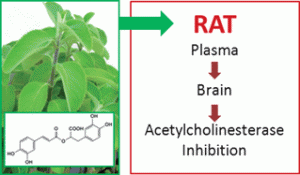A team from the University of Lisbon in Portugal has demonstrated, in vivo, the effects of a herbal tea (Lamiaceae) which may have beneficial effects on Alzheimer’s Disease.
 Leaves of Plectranthus barbatus (Lamiaceae) are used to make herbal teas and as a traditional remedy for a wide range of diseases, recently they have been shown, in vitro, to possess anti-oxidant and anti-acetylcholinesterase activity. Acetylcholinesterase (AChE) inhibition is the most effective pharmacotherapy for the symptomatic treatment of Alzheimer’s disease. The active component responsible from Lamiaceae has been identified as rosmarinic acid, however, effects of this compound in the body are dependent on its metabolism. It is these metabolites and the places they reach that will exert a physiological effect. In this study Serralheiro and colleagues set out to determine, in vivo, if Lamiaceae herbal tea and pure rosmarinic acid could pass the digestive tract and keep some of their functions, particularly in the brain given the potential Alzheimer’s benefits.
Leaves of Plectranthus barbatus (Lamiaceae) are used to make herbal teas and as a traditional remedy for a wide range of diseases, recently they have been shown, in vitro, to possess anti-oxidant and anti-acetylcholinesterase activity. Acetylcholinesterase (AChE) inhibition is the most effective pharmacotherapy for the symptomatic treatment of Alzheimer’s disease. The active component responsible from Lamiaceae has been identified as rosmarinic acid, however, effects of this compound in the body are dependent on its metabolism. It is these metabolites and the places they reach that will exert a physiological effect. In this study Serralheiro and colleagues set out to determine, in vivo, if Lamiaceae herbal tea and pure rosmarinic acid could pass the digestive tract and keep some of their functions, particularly in the brain given the potential Alzheimer’s benefits.
Lamiaceae herbal tea and pure rosmarinic acid were administered to rats intragastrically and intraperitoneally. The resulting metabolites in the plasma and brain were studied as was brain AChE activity. Upon intragastric administration of tea, only traces of metabolites were found in plasma and none in the brain. However, a decrease in brain AChE activity of about 10% was detected. When pure rosmarinic acid was administered intragastrically it was detected in the plasma. Upon intraperitoneal administration of tea all metabolites were detected in plasma and rosmarinic acid detected in the brain; resulting in a decrease in brain AChE of about three times that of intragastric administration.
Taken together the results suggest that the rosmarinic acid present in herbal teas may cross the intestinal barrier as well as the blood brain barrier. It has also been shown that in the brain rosmarinic acid inhibits AChE activity.
Read the full text for free here!
Function of Plectranthus barbatus herbal tea as neuronal acetylcholinesterase inhibitor
Pedro L. V. Falé, Paulo J. Amorim Madeira, M. Helena Florêncio, Lia Ascensão and Maria Luísa M. Serralheiro
Food Funct., 2011, Advance Article
DOI: 10.1039/C0FO00070A, Paper










